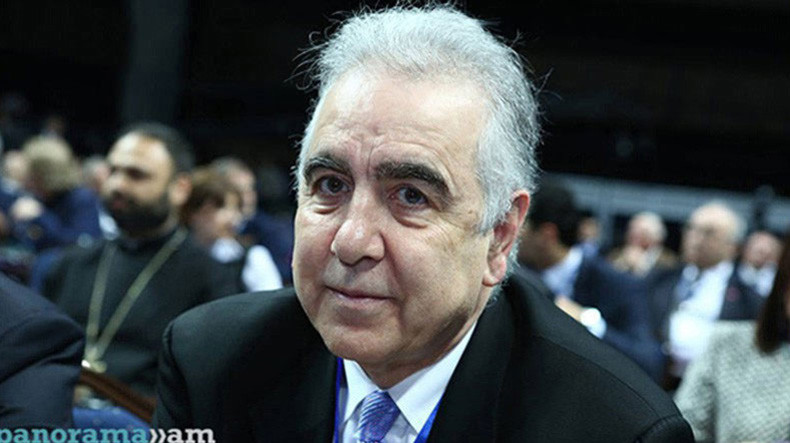
Pashinyan passes first political test in the international arena
By Harut Sassounian
Publisher, The California Courier
Last week, Armenia’s Prime Minister Nikol Pashinyan made his first appearance at the Parliamentary Assembly of the Council of Europe (PACE) in Strasbourg, France.
Pashinyan gave an impressive speech to the representatives of 47 European countries. Even more impressive were the Prime Minister’s answers to their dozen questions. While his speech was prepared in advance, the questions were impromptu and the answers had to be delivered on the spot.
Pashinyan began his speech by thanking the Council of Europe for repeatedly saving him from being imprisoned by the previous Armenian regime or reducing his sentence. He was being prosecuted for articles he had published as editor of the Orakir newspaper.
The Armenian Prime Minister then proceeded to recount the impressive democratic advances his country has made since last year’s peaceful “Velvet Revolution.”
Pashinyan took advantage of the opportunity to criticize the PACE members for not supporting the democratic developments in Artsakh. Even though “Nagorno-Karabakh is still not recognized internationally as a sovereign state, but is there international debate on whether the people living there are human beings?” Pashinyan asked.
In response to a question from French Parliamentarian Ms. Dalloz about corruption, Pashinyan stated: “Personally, the greatest thing I can do against corruption is for me personally to remain outside corruption. ...The very first thing is that I, my family and my relatives must be scrutinized even more closely than others, and it is very important to me that transparency should be a key aim in Armenia. I will not say that it is 100% successful, but it is leaping forward with giant steps. About 10 days ago a criminal case was initiated against one of my close relatives. I do not want to jeopardize their right to the presumption of innocence, but the fact is that the case is going to be investigated entirely lawfully and impartially….”
Ms. Aghayeva of Azerbaijan asked when would Armenia comply with resolutions and documents of international organizations on Artsakh? In his response, Pashinyan urged “the participation of the representatives of Nagorno-Karabakh in the peace process. It is hard to imagine how we can resolve the conflict without the main party to the conflict being involved in the peace talks and without talking to them. As I said in my statement, we will continue to try to reinstate the dialogue within the OSCE Minsk Group between Azerbaijan and Nagorno-Karabakh. Many of you might not know this, but there was a direct meeting between a leader of Nagorno-Karabakh and a leader of Azerbaijan in the past, so there is precedent. Elected representatives from Nagorno-Karabakh were almost always involved in the negotiations. It is said that, that was the case up to 1998, but I can tell you that up until 2018 Karabakh’s representatives were present in the peace talks. Let us not forget that Robert Kocharyan, before he became President of Armenia, was elected president of the republic of Nagorno-Karabakh. Thereafter Serzh Sargsyan represented Armenia but he was also one of the leaders of Karabakh. So Nagorno-Karabakh was represented at the negotiating table throughout the negotiations, and it is our objective today to create the conditions for this dialogue between Nagorno-Karabakh and Azerbaijan not to be interrupted….”
In response to a question by Ms. Tomic from Slovenia about the rights of the LGBT community in Armenia, Pashinyan responded: “Armenia is committed to the rule of law and all citizens have the same rights and obligations in the Republic of Armenia.”
Mr. Aydin of Turkey expressed his concern about Pashinyan’s recent statements on changing the negotiating format on Artsakh under “pressure from the Diaspora and the oligarchs within the country.” Pashinyan repeated the answer he had given to the Parliamentarian from Azerbaijan, adding that: “I have already explained that we are absolutely not expecting or demanding to change the format. …How do we see the Nagorno-Karabakh issue being resolved without the involvement of Nagorno-Karabakh? The word ‘occupation’ is used quite frequently, but the people who live in Nagorno-Karabakh were born there. They live there, as did their parents, grandparents, great-grandparents and great-great-grandparents – I could go on! How can someone occupy the land where they, their children and their ancestors were born, and where their ancestors are buried? … I recently did something that might seem strange. In a press conference, I publicly asked a rhetorical question: do Azerbaijan’s President and leadership have nothing to say to the people of Nagorno-Karabakh and the people of Armenia? I would like the opportunity to speak to the people of Azerbaijan. I can do that today, but I do not want it to be one-sided and I want to ensure that it is not perceived as an act of provocation. I want to initiate such discourse with government, people and young people. Our agenda is one of peace, and we do not propose to change the format.”
Regarding a question asked by Mr. Ariev of Ukraine on “who does Crimea belong to?” Pashinyan answered: “... We often find that our friends are on different sides of a conflict, and it is hard for us to choose between two friends. We are sometimes forced to make a choice, but globally our choice is pro-peace, pro-dialog, pro-stability and pro-development.”
In response to the final question from Mr. Masiulis of Lithuania regarding whether Armenia would be more pro-European and less pro-Russian, Pashinyan responded: “When I was a member of the opposition, I declared that I did not accept that Armenia or any other country ought to be pro-Russia, pro-Europe, pro-America or whatever. I consider myself to be a pro-Armenia politician. I think that French politicians are pro-France, Ukrainian politicians are pro-Ukraine and Russian politicians are pro-Russia….”
Armenia’s Prime Minister skillfully responded to all the questions and sometimes, cleverly avoided answering them. This was the first test of his political competence in the international arena which he passed with flying colors!
Newsfeed
Videos






























